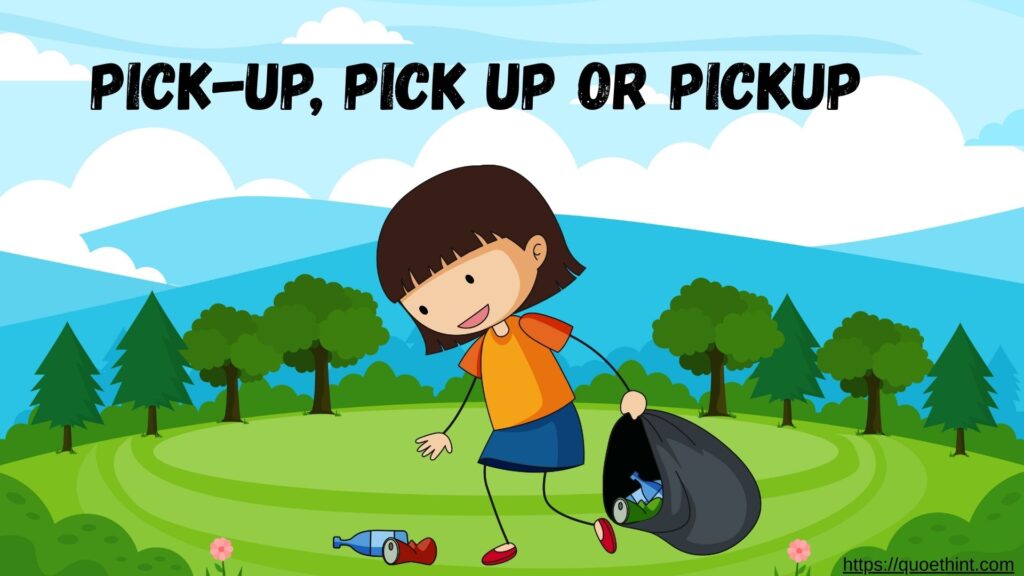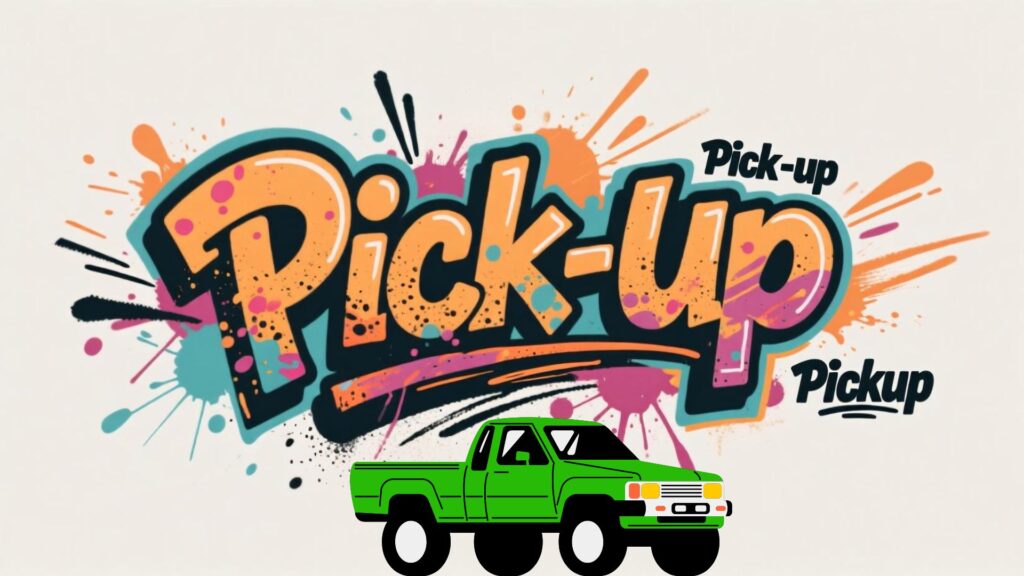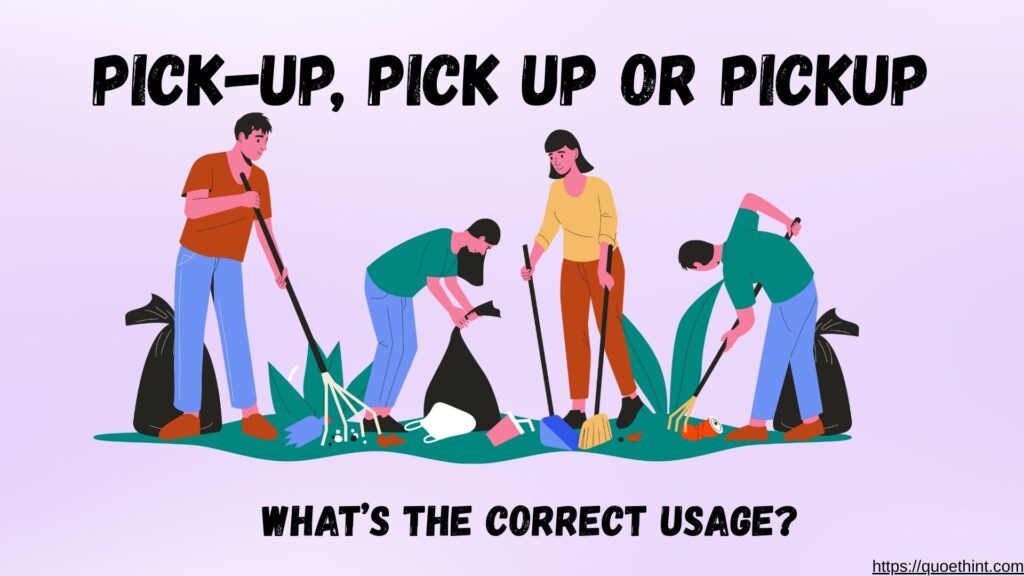Ever stared at your screen wondering, “Should I write pick-up, pick up, or pickup?” If yes, you’re not alone. This trio is one of those English usage confusions that trip up even native speakers. The difference may seem tiny, but it changes how the word functions in a sentence.
Let’s break it all down clear rules, real-world examples, quick tables, and scenario-based emails so you never second-guess yourself again.
Keyword + Intro Explanation

Here’s the quick scoop before the deep dive:
- Pick up (two words) = a phrasal verb. It’s an action, like “I’ll pick up my bag.”
- Pick-up (hyphenated) = an adjective or compound noun that modifies another word, e.g., “pick-up location.”
- Pickup (one word) = a noun. Often refers to a truck, a boost in speed, or even business improvement.
Sounds simple? Well, there are nuances you should know.
Simple Definition + Usage Overview
- Pick up meaning: To lift, collect, or retrieve something or someone.
- Pick-up meaning: Used to describe services, times, or points related to the act of picking up.
- Pickup meaning: Refers to a thing, like a pickup truck or a pickup in sales.
Clear Rules & Patterns
✅ Use “Pick Up” When It’s a Verb Phrase
Think action. If someone is doing something collecting, lifting, or fetching you need pick up.
✔ I’ll pick up my shoes from the cobbler.
✔ Can you pick up the pace?
✅ Use “Pick-up” as an Adjective or Noun Modifier
If you see it before a noun (acting as a descriptor), add the hyphen.
✔ We offer a free pick-up service for online orders.
✔ The pick-up point is next to the main entrance.
✅ Use “Pickup” as a Noun
When referring to an object, a type of vehicle, or an improvement, go for pickup.
✔ Mark bought a brand-new pickup truck.
✔ There’s been a strong pickup in sales this quarter.
Bulleted Rules with Do’s and Don’ts
Do:
- ✅ Use pick up for verbs: “I will pick up dinner tonight.”
- ✅ Use pick-up before a noun: “Pick-up time is 4 PM.”
- ✅ Use pickup when it’s a noun by itself: “Sales showed a pickup.”
Don’t:
- ❌ Don’t write pickup as a verb: Wrong: I’ll pickup the keys.
- ❌ Don’t hyphenate when it’s a verb: Wrong: Please pick-up the phone.
Scenario Examples for Each Usage
Example 1: Using “Pick Up” in an Email
Subject: Can You Pick Up the Package Today?
Hi Alex,
Could you pick up the package from the delivery office before 6 PM? If not, let me know so I can arrange a scheduled pick-up for tomorrow.
Thanks,
Laura
✔ Why this works: “Pick up” is a verb phrase because Alex needs to perform an action.
Example 2: Using “Pick-up” as an Adjective
Subject: Update on Pick-up Points
Hello David,
We’ve added two new pick-up points across town for your convenience. Check the attached map for details.
Regards,
Emily
✔ Why this works: “Pick-up” is modifying the noun “points.”
Example 3: Using “Pickup” as a Noun
Subject: New Pickup Trucks in Stock
Hi Robert,
Great news! We’ve got the latest pickup models available. Visit our showroom this weekend for a test drive.
Cheers,
Karen
✔ Why this works: “Pickup” is a noun referring to a type of vehicle.
Multiple Example Sentences
- Please pick up the phone.
- The hotel offers pick-up service from the airport.
- We noticed a sudden pickup in orders last month.
- Can you pick up groceries on your way home?
- The pick-up time is fixed for 5 PM.
- John owns a classic pickup truck.
Common Mistakes & Fixes
| Mistake | Correct Form |
|---|---|
| I will pickup the kids later. | I will pick up the kids later. |
| The hotel offers pickup service. | The hotel offers pick-up service. |
| He bought a pick-up truck. | He bought a pickup truck. |
Quick Reference Table
| Form | Function | Example |
|---|---|---|
| Pick up | Verb phrase | I’ll pick up my parcel today. |
| Pick-up | Adjective/Noun | The pick-up location is on the left. |
| Pickup | Noun | Lisa drives a black pickup truck. |
Origins of “Pickup,” “Pick-up,” and “Pick Up”

The phrase pick up started as two separate words in Middle English, meaning “to gather or lift.” Over time, when used as a compound noun, it became pick-up, and eventually pickup in contexts like vehicles and business improvement.
American English favors pickup as one word when it’s a noun, while British English sometimes sticks to pick-up for longer.
Synonyms and Related Terms
- Pick up synonyms: fetch, collect, retrieve, gather.
- Pickup synonyms: boost, increase, recovery, truck.
- Related terms: drop-off, scheduled pick-up, ready to pick up.
Idiomatic Uses of “Pick Up”
This phrase isn’t just about lifting objects. Check these idioms:
- Pick up the pace = move faster.
- Pick up a skill = learn something new.
- Pick up where you left off = resume from the last point.
✔ Example: After lunch, let’s pick up where we left off.
Before/After Examples in Everyday and Formal Contexts
Everyday:
- ❌ Before: I will pickup some snacks.
- ✅ After: I’ll pick up some snacks.
Formal:
- ❌ Before: The hotel provides free pickup service.
- ✅ After: The hotel provides free pick-up service.
Pickup in Different Contexts
- Pickup in logistics: scheduled pickup for deliveries, free pickup service.
- Pickup in business: a pickup in sales after a marketing campaign.
- Pickup truck: vehicle with a cab and cargo bed.
Key Takeaways
- Pick up = verb phrase (action).
- Pick-up = adjective (modifies noun).
- Pickup = noun (object, vehicle, improvement).
Remember these and you’ll never get it wrong again.
Bugti is the founder of Quoethint.com, a hub for English language tips, writing advice, and grammar guidance. With years of experience in English studies and a passion for clear communication, Bugti created this platform to make grammar and writing easy to understand for everyone.
